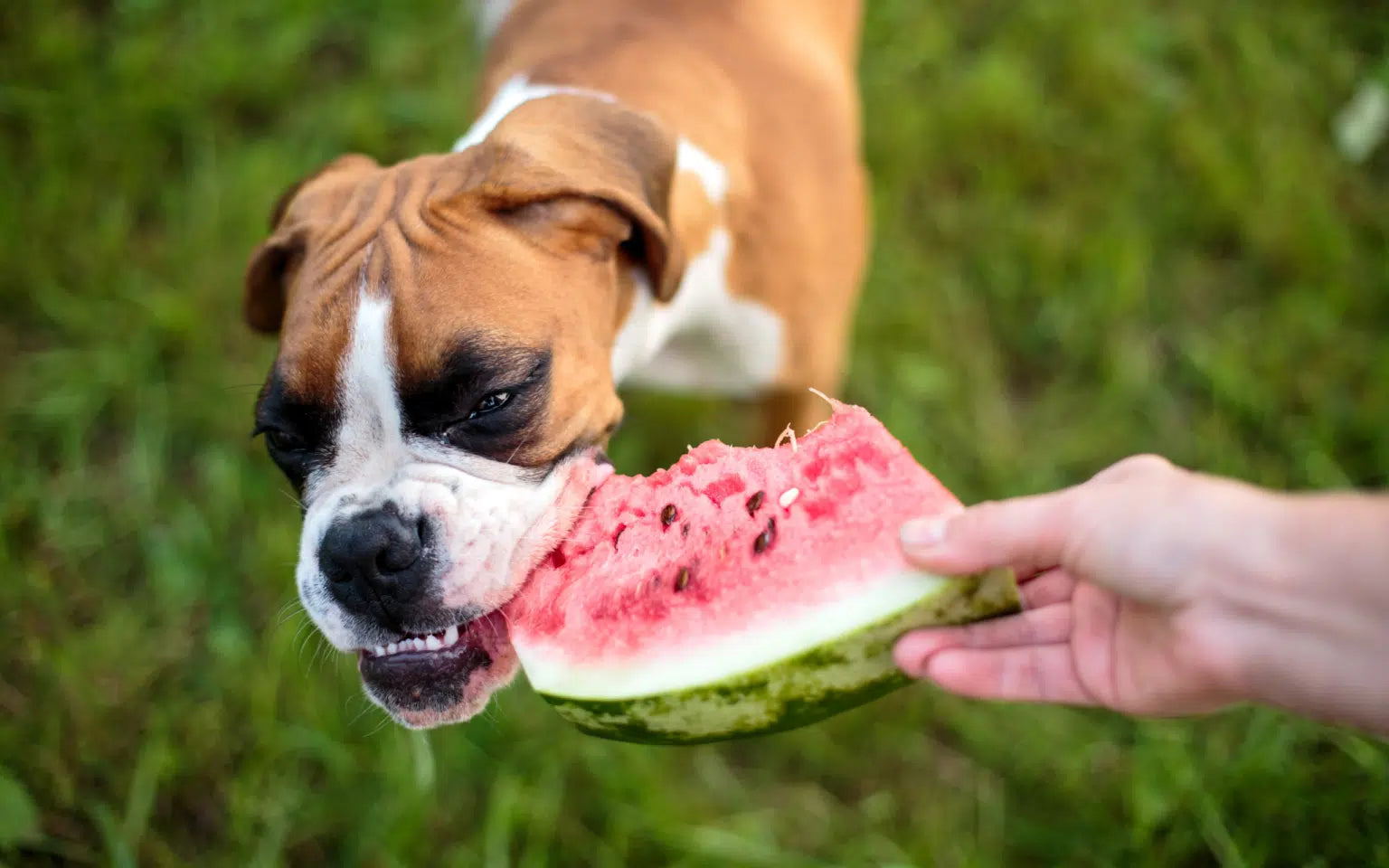Is Watermelon Good for Dogs?
I think we can all honestly agree that dogs are scavengers and as such they would eat pretty much anything. However, that doesn’t mean that they should. There are certain human foods that are harmful for dogs. Is watermelon one of them? Or can dogs safely enjoy this refreshing fruit on a hot summer day? The good news is that dogs can also enjoy this juicy fruit, however, there are some very important things to know first before giving your canine friend this juicy treat. Let’s start with the good stuff.
Health Benefits of Watermelon:
- Helps with hydration. Watermelon is made of 92% water, which means it can be a good way to ensure your furry friend remains well hydrated, especially on a hot summer day. However, your dog should not rely on watermelon for hydration.
- Packed with nutrients. Watermelon is a rich source of nutrients, including potassium, magnesium, vitamin A, B6 and C. Vitamin A is essential for maintaining good vision and support bone growth. Vitamin C plays a key role in immunity and potassium is key for normal nerve function, muscle contraction and healthy heart function.
- Rich source of Antioxidants. In addition to Vitamin C, watermelon also contains carotenoids, lycopene and cucurbitacin E, which all boast antioxidant properties and therefore essential in fighting free radicals, which can cause damage to the cells in the body contributing to health issues such as heart diseases, cancer or diabetes.
- Great source of fibre. Fibre is important in good digestion and maintaining normal bowel movements. Fibre also helps counteract the effects of the sugar found in watermelon by preventing it from being absorbed into the bloodstream too quickly.
- Low in calories. The high water content also ensures that watermelon is low in calories, sodium and free from fat and cholesterol. However, dogs that have diabetes or sugar sensitivities as well as dogs that are obese should not be given the fruit.
- May reduce inflammation. Most chronic diseases are ’born out’ of prolonged inflammation in the body. The combination of antioxidants, lycopene, and vitamin C in watermelon may help lower inflammation and oxidative damage.
- Supports skin health. Vitamins A and C (both found in watermelon) are important in skin health. In one study, animals with vitamin A deficiency had poorer wound healing than those fed a nutritionally complete diet (Vitamin A and Wound Healing).
Can dogs eat watermelon rind?
Make sure that your dog does not eat watermelon rind. It’s not safe for them to consume, as it can become a serious choking hazard or create an intestinal blockage. If your dog has swallowed a watermelon rind, visit your vet immediately.
Can Dogs Eat Watermelon Seeds?
The short answer is no as the black seeds contain cyanide, although it’s unlikely that a dog would be able to eat enough of them to be poisoned. The seeds can also be a potential choking hazard. If your dog has eaten some of the seeds, you might need to contact your vet. A small amount is unlikely to cause any issues, however, best to watch put for any symptoms of an upset stomach:
- Decreased appetite or loss of appetite
- Fatigue
- Acting depressed
- Looking uncomfortable
- Gulping or licking their lips, the air, or objects
If you notice any of these symptoms, contact your veterinarian right away. Worsening symptoms include:
- Vomiting
- Excessive diarrhoea
- Blood in their vomit or stool
- Weakness
- Collapse
If you notice any of these more serious symptoms, call your vet and take your dog to the vet immediately.
How Much Watermelon Can a Dog Eat?
Even healthy treats should only make up 10% of your dog’s overall diet. And the other 90% should come from a well-balanced dog food diet. To help make the portions a little easier, below are some general guidelines for safe watermelon treat sizes based on your dog’s weight. Each “slice” should only be about 2cm x 2cm x 0.5cm thick:
- Small dog (Beagles, Spaniels) = 2-3 slices of watermelon
- Medium dog (Border collie) = 5-6 slices of watermelon
- Large dog (Retrievers, German Shepherds) = handful of watermelon slices
- Extra-large dog (St. Bernard's) = large handful of watermelon slices
How to feed your dog watermelon?
- It can be made into enticing ice cube treats mixed with or without other healthy ingredients that your dog will be unable to resist while keeping cool. However, make sure your dogs’ teeth are good and won’t be damaged by chewing frozen food.
- Remove the seeds, mash or blend a little watermelon, then pour it over your dog’s food, or put it in a hoof or buffalo horn to freeze and serve later. You can also spread it on a lickpad.
- Make your pup a fruit smoothie by blending up watermelon with some other dog-safe fruits like bananas or strawberries. Then combine that fruit mixture with plain, sugar-free, Greek yogurt. Refrigerate the mixture so you can put a little on top of your dog’s food later. Or you can put it in their KONG toy to freeze for a very refreshing treat.
Watermelon can be a great addition to a dog’s diet. Cutting the watermelon into small easy-to-chew cubes after removing the seeds and rind is a great way to make a small and healthy treat for your dog. But remember, no more than 10% of your dog’s daily calorie intake should come from treats and no more than 20% from fruit and vegetables so give watermelon in moderation.





